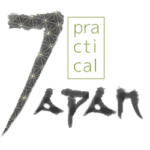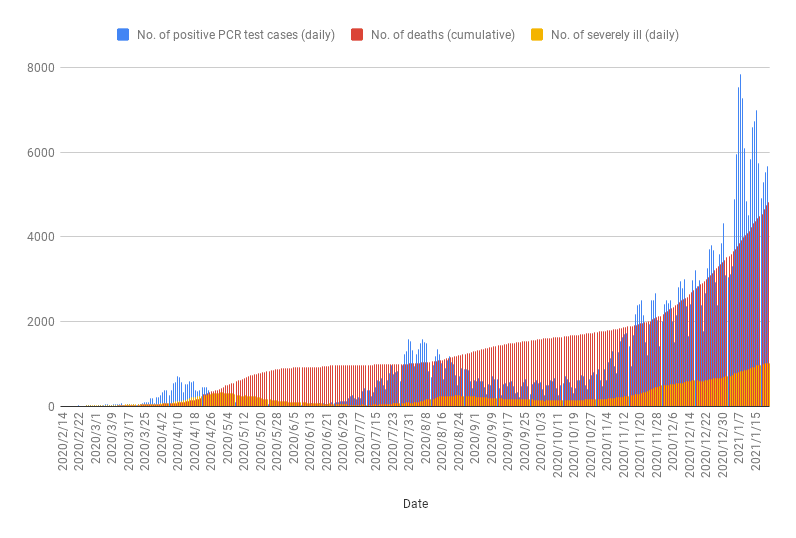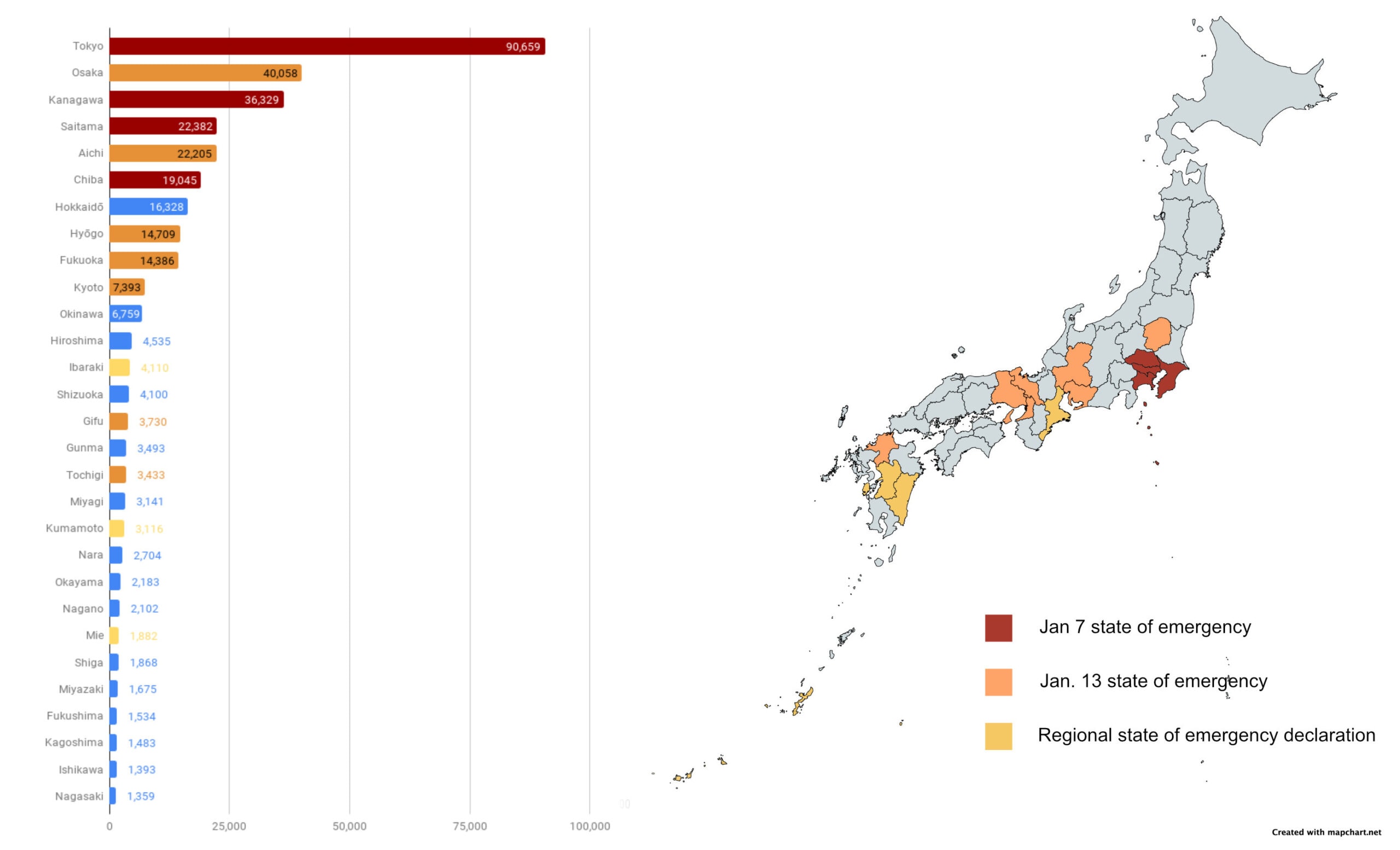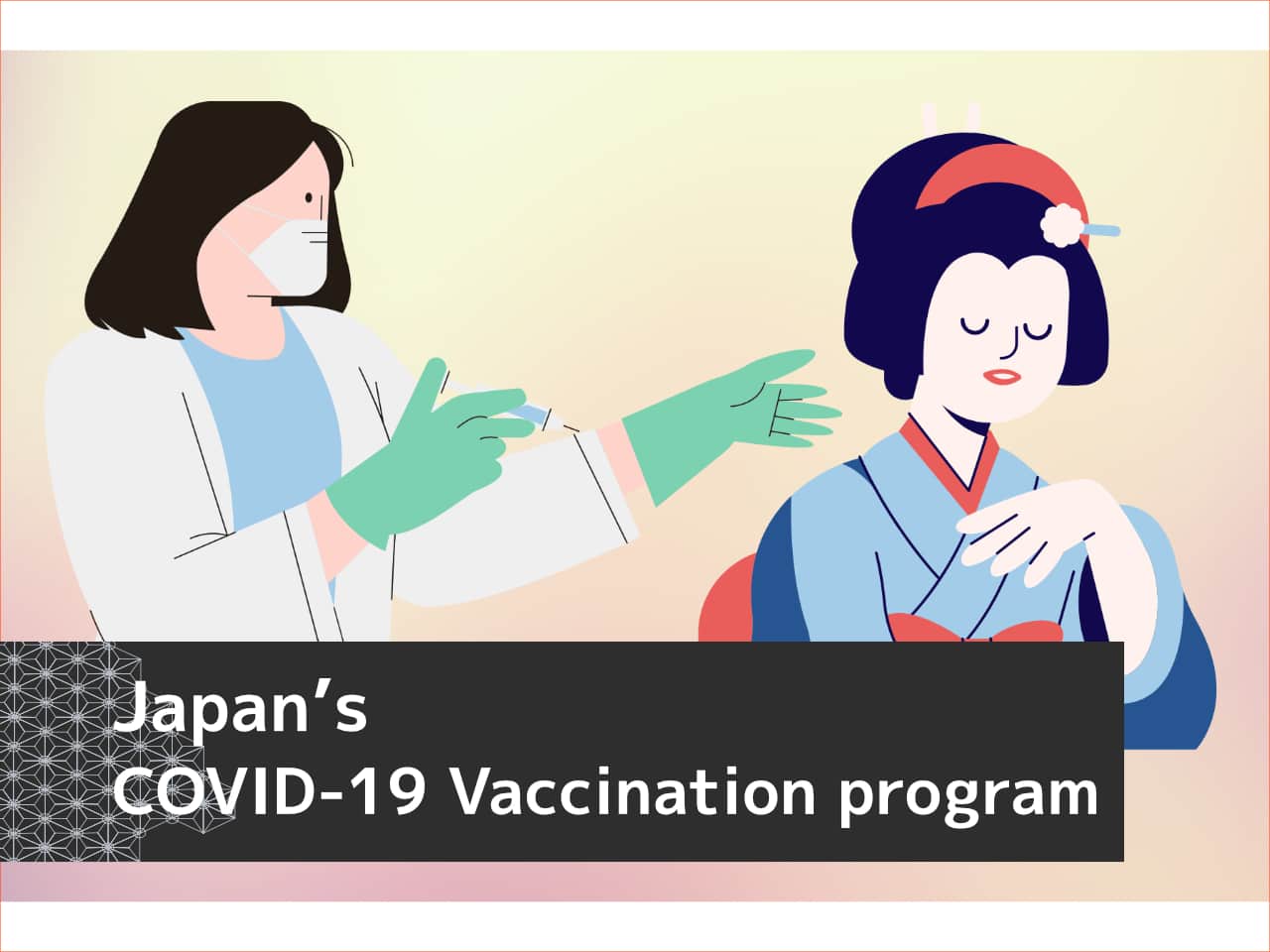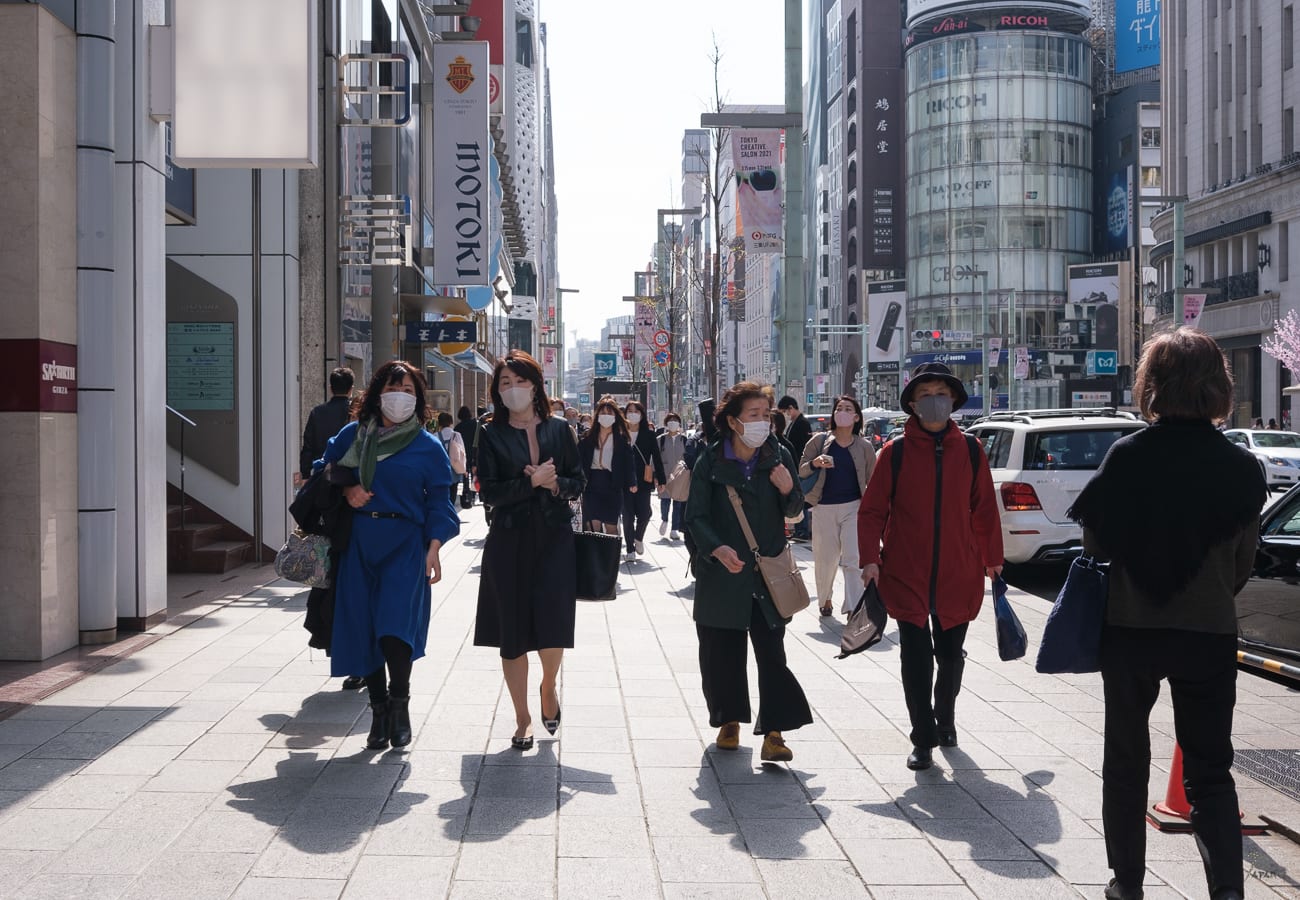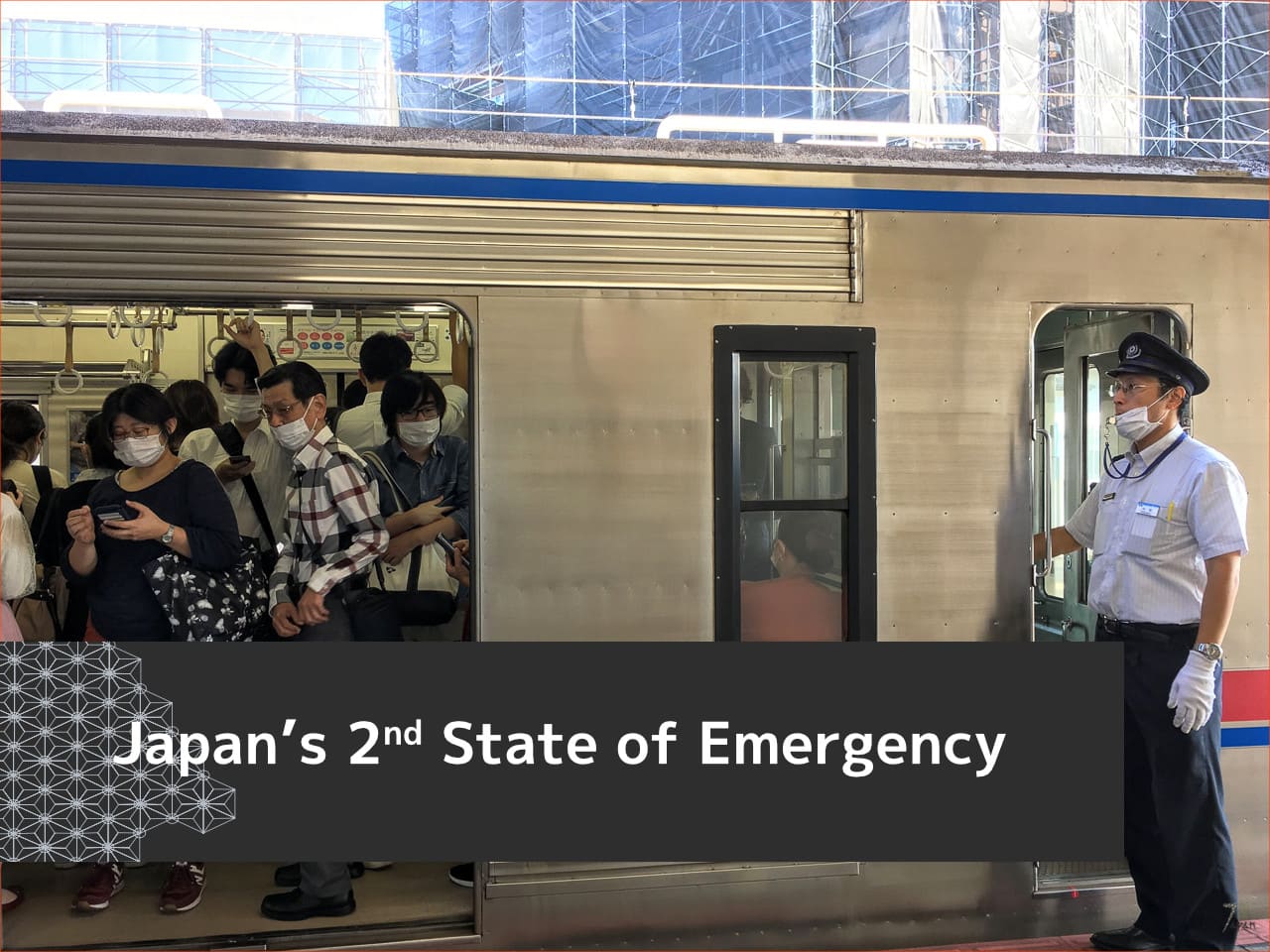
As Japan enters the coldest months of the year, the number of COVID-19 infections is on the rise. With one eye on the Tokyo Olympics planned for summer, and the other on the economy, Prime Minister Suga announced the second state of emergency on January 7, 2021. Read on for an overview of how the 2021 state of emergency in Japan will influence daily life and travel.
2021.2.4 UPDATE: New fines for noncompliance with anti-coronavirus laws and regulations will take effect on February 13.
2021.2.7 UPDATE: The Government extended the state of emergency by one month (until March 7) in 10 out of 11 prefectures. Only Tochigi had its state of emergency lifted as planned on February 7.
Which prefectures are affected by the 2021 state of emergency in Japan?
On January 7, the Government announced that Tokyo, Saitama, Chiba and Kanagawa, prefectures will be put under a state of emergency. A week later, on January 13, the list was expanded to include Osaka, Kyoto, Hyogo, Aichi, Fukuoka, Tochigi and Gifu prefectures.
In addition to the ‘national’ declaration, some prefectures with high hospital bed occupancy rates, such as Ibaraki, Mie, Kumamoto, Miyazaki, Okinawa, introduced their own states of emergency.
The current state of emergency is expected to last until February 7, but may be extended if the epidemiological situation does not improve.
What does life look like under the state of emergency in Japan in 2021?
The brief answer is not much different from how things looked like in the last couple of months.
The Japanese version of a state of emergency is far less strict than the lockdowns introduced in other parts of the world, such as Europe, or China. The prefectural governments can issue “requests” to individuals and business, but they have no legal instruments to enforce them. This may change soon, as the government is working on a revision of a special anti-coronavirus law aimed at introducing fines for incompliance with anti-COVID-19 measures (shortening of business opening hours, mandatory hospitalization for COVID-19 patients, etc.).
During the current state of emergency, prefectural governors have asked that residents avoid unnecessary outings after 8 p.m., wear masks, keep social distance, and disinfect their hands often. However, because the request is nonbinding, people are mostly going about their daily lives as usual for the “with corona” times. Some are refraining from going out other than for groceries or to commute to work. While others continue to go to restaurants, bars and gyms.
As for businesses, the governors “requested” that some sectors, like bars and restaurants, close by 8 p.m. and that train operators stop their late night services earlier. Organizers were asked to cap attendance at events at 5,000 people or 50% of venue capacity. There is also an ongoing campaign to have companies help reduce the number of commuters by switching 70% or more employees to teleworking or introducing staggered work shifts.
As things stand now, whether businesses and individuals follow the government’s requests, is entirely voluntary. Japanese media reports suggest people are tired of COVID-19 restrictions and less inclined to comply with governments’ requests than during the previous state of emergency.
Which businesses and institutions are closing or shortening hours?
The businesses specifically targeted during the 2021 state of emergency are restaurants and bars – places where people congregate and often spend a long time together, sometimes speaking without their masks on. Even if a business type was not explicitly mentioned by the government, the owners may decide to close temporarily, shorten their hours or limit capacity.
The businesses most likely to be affected are:
■ bars, restaurants, cafes, nightclubs;
■universities, language schools, driving schools, community centers, daycare centers and nursing schools, elderly-care facilities;
■ gyms, swimming pools, training studios;
■ concert halls, theaters, cinemas, stadiums, museums, libraries, amusement parks;
■ supermarkets, shopping malls and department stores.
A list of major tourist attractions that are closed or have changed their opening hours can be found on the website of the JNTO.
Essential services and facilities, such as hospitals, pharmacies, stores selling food and other indispensable items, hotels, public baths, banks, post offices, administration offices and public transportation, will remain open.
Will public transportation operate normally?
The governors of Tokyo and surrounding prefectures requested that train operators move up the last train departure times. All major train companies have complied and introduced changes in their schedules from January 20 until the end of the state of emergency. Depending on the company, the last train may leave earlier by up to 30 minutes.
The Central Japan Railway Company has also reduced the number of shinkansen connections from Tokyo between January 18 and February 28.
Some highway bus operators suspended overnight busses and travel on routes from Tokyo to other prefectures.
Japanese airlines have announced they will limit the number of domestic flights from January 13 to January 31.
How will the 2021 state of emergency in Japan affect immigration and foreigners in Japan?
Is there an entry ban to Japan due to the state of emergency declaration?
Japanese citizens and foreigners who have a status of residence in Japan are still allowed to enter. However, there are several requirements and rules:
- Take a COVID-19 test within 72h before arrival in Japan and submit a certificate of negative test result for COVID-19 on arrival.
- Take another COVID-19 test on arrival if you have visited countries on the denial of permission to entry list within the last 14 days before arrival in Japan.
- Sign a pledge to conform to anti-COVID-19 rules.
- Stay in quarantine for two weeks after arrival and do not use public transport.
- Download and use the COCOA app and store location information via a map application during the quarantine period.
There are no fines for violating these rules (yet), but foreign residents may be subject to revocation of resident status and deportation.
The special corridor for business travelers and students from selected Asian countries (such as Taiwan, Thailand, South Korea and Vietnam) has been suspended until the end of the state of emergency. For more details, visit the website of the Ministry of Foreign Affairs of Japan.
Can I go to the immigration office to renew my visa?
Yes, you can go to the immigration office to renew your visa. However, the capacity is limited. You will be assigned a specific group and time you are allowed to enter the building. The immigration offices request that you not go in person unless absolutely necessary.
There are various procedures that can be taken care of online: extension of period of stay, certificate of eligibility, re-entry permission, permission to engage in activity other than that permitted under the status of residence previously granted. However, you will need to ask your receiving organization to request the use of the online application system first. According to the Immigration Services Agency, only a staff member of the organization of which the foreign national belongs, or certain individuals appointed by that organization, may take advantage of the online system.
What if I can't return to my country because of COVID-19?
If you cannot return to your country because of COVID-19 travel restrictions and your visa is expiring soon you can apply to the Immigration Services Agency to change your visa to a 6-months “designated activities” visa with a work permit. This can be further extended if your situation has not changed after 6 months.
If you have difficulty maintaining your livelihood in Japan, you may apply for a permission to engage in activities other than those permitted under the status of residence previously granted. This permit will allow you to work up to 28 hours per week in jobs other than those included in your current residence status.
If you find it difficult to find a job, you can receive assistance from the Japanese government. The Immigration Services Agency will share your information with an employment agency, which will look for jobs for you. Alternatively, Hello Work offices also provide information on job vacancies.
Where can I get help?
Various organizations in Japan operate websites, hotlines and information centers offering information related to COVID-19 in English and other languages. The list below contains just a few examples.
COVID-19 hotlines and information centers
Most hotlines and information centers listed here offer help in English and other languages, such as Chinese and Korean.
- Japan Visitor Hotline – a 24h hotline operated by Japan National Tourism Organization (JNTO). Service in English, Chinese, Korean, Japanese.
- Information on local call centers in Japan – Ministry of Health, Labour and Welfare
- MOFA visa information service – MOFA
- Telephone Consultation Service for Foreign Workers – MHLW
COVID-19 related websites
Epidemiologic situation in Japan and countermeasures
■ COVID-19 Information and Resources – Cabinet Secretariat, Government of Japan
■ Useful information on the novel coronavirus disease (COVID-19) – Prime Minister of Japan and His Cabinet
■ Updates on COVID-19 in Tokyo – Tokyo Metropolitan Government
■ Coronavirus (COVID-19) advisory information – JNTO
■ A guide for when you are feeling ill – JNTO
■ Temporary closure of Attractions in Japan – JNTO
■ Statistical data on epidemiologic situation in Japan – MHLW
Immigration and travel to Japan
■Border enforcement measures to prevent the spread of novel coronavirus (COVID-19) – MOFA
■ Information on the special Business and Residence track – MOFA
■ Q & A on quarantine measures after arrival in Japan – MHLW
■Information related to Novel Coronavirus Infection(COVID-19) – Immigration Services Agency
Disclaimer
The information provided on this website is intended for informational purposes only and should not substitute for a lawyer. This information does not constitute legal advice. Please consult with an immigration lawyer regarding your individual case. The information is provided “as is” without warranty of any kind, either expressed or implied, including, but not limited to the implied warranties of merchantability, fitness for a particular purpose or non-infringement of third party rights. Although we try to be as timely and accurate as possible, please be aware that immigration is a constantly evolving area of law and there have been recent changes to immigration policies or laws that may affect you.
Please share!
If you have found information in this post useful or interesting, please like it or share it on social media. Thanks!


MARTA TAKAHASHI
Photographer and explorer with over 10 years of experience living and working in Japan
